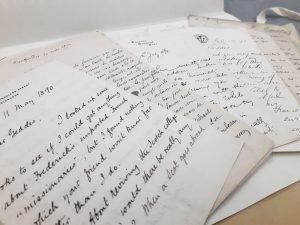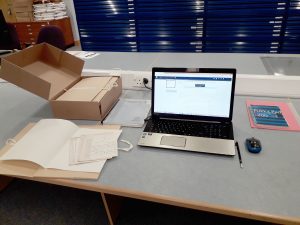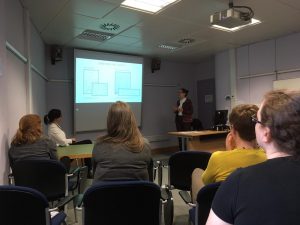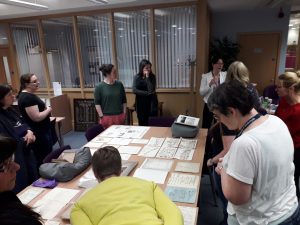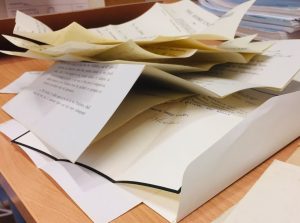Phew! That was a fast 8 weeks! As our archive cataloguing project intern, Sorina Mihai, nears the end of her internship, we invited her to share the highs and lows of her experience. Tasked with creating 640 new catalogue descriptions, cataloguing a discreet series of correspondence, creating social media content, presenting her work to peers (among other things) – Sorina certainly had her work cut out for her. Has working with Patrick Geddes and his archive collections changed her forever? Let’s find out…
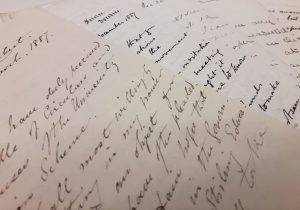
Selection of correspondence from the Patrick Geddes papers (Ref:T-GED12/3)
It has been an exciting eight weeks which gave me tremendous satisfaction from the variety of tasks I was involved in, from handling 19th and 20th century correspondence to having access to the beautiful Patrick Geddes Collections. The internship enabled me to gain a deeper understanding and insight into the archives profession, and allowed me to think more broadly about archives cataloguing and its importance. On a personal level, I have developed my organisational skills and gained more self-confidence. I can see how my work facilitates access and discovery to archive collections, enhancing the capacity of researchers to browse catalogue descriptions online to discover new correspondents and connections. My experience has helped me to understand that an archivist’s role is not just about preserving collections, but also about conserving, promoting and making information accessible to existing and new audiences. Archives not only provide evidence of activities and their context, they also increase our knowledge and understanding of individuals, history, ideas, theories and cultures. This was an immense opportunity to gather knowledge and experience to support my future career as an archive and information professional.
I have enjoyed cataloguing a series of correspondence which relates to Patrick Geddes’ educational projects and spans some 45 years, 1886-1931 (Ref: T-GED12/3). It reveals many of Geddes’ social and educational enterprises, such as providing comfortable and affordable lodging for students, making education more accessible for the working classes through the University Extension Scheme, and using historical theatrical performances to educate audiences through ‘Masques of Learning’. Other correspondence within this series discusses outdoor nature study, adult and teacher training, Summer Meetings and university work in Calcutta, India. Multiple locations are covered, from Scotland, England, India, and France, to the U.S.A. and Israel. The financial strains of the Town and Gown Association and Geddes’ University Student Halls in Edinburgh and London are also documented. In this series of letters, Geddes’ correspondents are mainly teachers, educators, social reformers, scientists, and academics. Discovering fascinating personalities such as Robert Smith (1874-1900), botanist; Jessie Mabel Dearmer (1872-1915), novelist, dramatist, children’s book author and illustrator; Helen Walton (1859-1945), artist; Ananda Kentish Coomaraswamy (1877-1947), art historian; and Maurice Paterson (1836-1917), educationist (to name only a few) was such a pleasure.
This series of correspondence also reflects Geddes’ deep interest in educational reform as well as his capacity to work on many projects at the same time. His London ‘Masque of Learning’ in 1913 was so successful, that after the original representations to the general public, it was extended for the benefit of schools and historians taking part in an International Historical Congress. Afterwards, Geddes made tentative preparations for staging ‘The Masque of Learning’ at the International Exhibition in Ghent later that year, while at the same time planning his own contribution to the exhibition.

Marie Bonnet, first on the left, with Edith Hilliard, Norah, Arthur and Alasdair Geddes (Ref: T-GED 22/3/15/2)
Part of my internship required me to create two comprehensive name authorities which document individuals and their relationships with other people within the collection, in accordance with recognised international professional archival standards. Historically, women have often been underrepresented in archive catalogues. There is a vast network of female correspondents and collaborators to be found within the Patrick Geddes archive collections and drawing out the identities, stories and contributions of these women was an area which I was keen to contribute to. With the support of project archivist Elaine, I elected to create a name authority description for Anna Geddes (1857-1917), music teacher and Patrick Geddes’ wife and constant collaborator, and the other for Marie Bonnet (1874-1960), a social reformer and close family friend who belonged to the Montpellier Geddes circle. The research process presented its own challenges, because of limited biographical resources, inconsistent dates in Marie Bonnet’s case, and fragmented information on Anna Geddes which focused mainly on her domestic life. This required investing more time and effort in the research process, which made me reflect on my time management practices and the need to factor in buffer time to deal with unexpected challenges.
Undertaking research in order to create name authorities has enabled me to discover and use biographical online resources, as well as relevant biographies on the life and time of Patrick Geddes. It has widened my background knowledge on Patrick Geddes’ interests and network of correspondents, as well as the culture and social movements of the second half of the 19th century and beginning of the 20th century. This has helped me better understand, interpret and contextualise the correspondence and articulate this clearly in the catalogue descriptions.
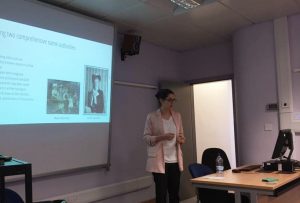
Sorina Mihai, archive cataloguing intern, presenting her work to professional peers.
The internship allowed me to hone my social media and presentation skills. As my experience in these fields was previously limited, this was an important development area for me and I feel I have benefited enormously from the experience. Tweeting collection highlights, participating in Twitter campaigns on ‘International Archives Day’ and ‘What’s in the Archive Box’, allowed me to understand how social media can be used as an outreach tool for collection promotion and discovery. Using photograph collages and Movie Maker apps to create visual content which reflected the collection, allowed me to experiment with new and innovative engagement tools. Being active on social media also made me aware of the complex challenges presented by copyright legislation and compliance. I gained more knowledge surrounding the copyright of visual materials in particular, which complemented my training from the ‘Information Law’ module of my Information and Library Studies MSc.

Sorina selected a range of items for display, such as correspondence, leaflets, books and photographs from the T-GED Collection, University of Strathclyde Archives and Special Collections.
Delivering presentations about my work within the project has given me more confidence in myself and my capacity to speak in front of an audience. It was a good opportunity to develop the capacity to plan, structure, curate and exhibit materials needed for my presentation. My previous experience in helping project archivist Elaine deliver a presentation at the beginning of the internship was very useful in terms of time-planning, structuring, selecting and presenting items from the collections in a coherent and comprehensive manner. It also made me realise that the way we articulate and share information about what we do can influence the audience’s perception of the collection, communicate its importance and gather wider support from people in the community, professionals, and funding organisations.
The process of writing about my internship was a great way to reflect on my experience and consolidate my learning, as well as thinking through how I may apply that to my professional development. Additionally, blog posts are a useful outreach tool which allow people to find out more about the project and its goals, by providing new information about the collection, the work undertaken and present progress. Like presentations, they are useful advocacy tools for increasing visibility and demonstrating the value of archival work and collections.
What I’ve enjoyed most about the internship was the variety it offered, the opportunities to develop and enhance skills across a broad range of activities that reflect current and future practice within the archives field. I am grateful for the opportunity to have covered cataloguing, professional international archival standards, and legislation that impacts on archives. Audience engagement and development, advocacy, reflective writing, research skills, and having contact with so many professionals in the field in such a short time has also been immensely beneficial. I now feel more confident in using international archival standards, giving presentations, managing my time and multitasking. The tasks assigned were realistic and could be completed within the 8 week time-frame.
I also feel deeply grateful and fortunate to have worked with a team of such dedicated, talented and amazing professionals, who gave me constant support and shared so much of their knowledge and passion for their work as archivists. I wish to thank project archivist Elaine most of all for her constant support, encouragement, guidance and for making the internship so interesting and rewarding. I wish to thank the teams at the Centre for Research Collections at the University of Edinburgh and the Strathclyde Archives and Special Collections for making the internship such a wonderful experience, it was a pleasure working with you all!

